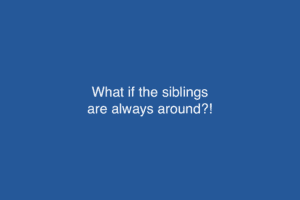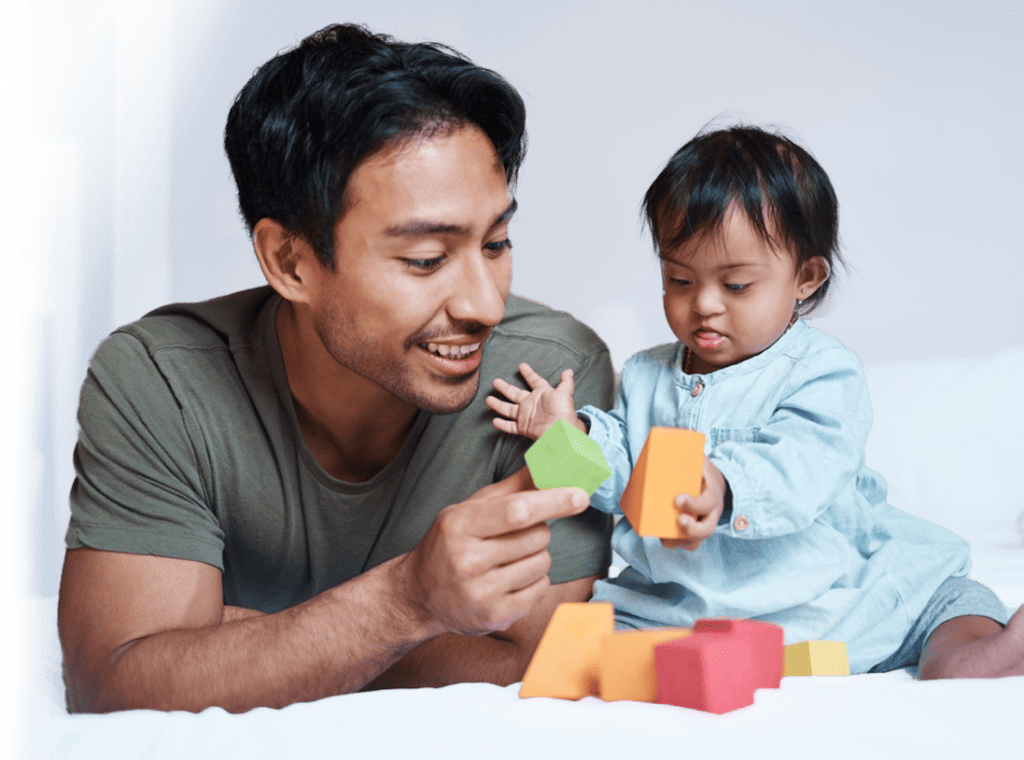So, the next question I wanted to answer really deals with how to incorporate or cope with those pesky siblings that um, are definitely around more in the summer time, um, when you’re trying to do co-regulation activities with your child who has more developmental challenges.
Oftentimes siblings can get very competitive. I’ve seen it, ha. It’s gotten a little scary a few times in my clinic. Um, and they’d know just what buttons to push for their sibling. So, actually having your child learn to play with another child is sometimes easier than having them learn to play with their own sibling. However, right now given the circumstances, other kids aren’t necessarily always available. So, to give you guys some ideas, one of my favorite go-to strategies when I’m working with siblings is to really think about the dynamic. Um, it’s me, the therapist, or two siblings, or it might be you, mom, or you, dad, and your two or three children, right? And you’re trying to play a game with them. So, for example, one of the co-regulation games was hide and seek. The dynamic that you set up for the way that that game is going to work is important in the circumstance, because you want to really make yourself on one team, and the kids on a team together. That way, they’re starting off in an alliance, um, and they have a common goal, um, and it’s defeat you, right? You make yourself kind of the bad guy. And usually that will help children, um, kind of cope with, um, you know, being on the same page. Cope with each other, um, you know. Get, uh, get on in alignment with each other’s ideas a little bit more quickly, than if you’re just playing it kind of willy-nilly and there’s not really that dynamic preset in advance. Some of the cooperative board games that I mentioned today, also are great with siblings. Because, like I said, it’s not a competitive situation, it’s a cooperative game. So those games that I mentioned from Peaceable Kingdom, where, you know, there’s Hoot Owl Hoot, which is available at Target. I think, there’s a long list of different games that they make that are cooperative in nature, but they really are developed to help children have a common goal, a common focus, um, and there’s not a winner in those games. The winner is the owl – the owls who will make it back to their nest before the sun comes up. So, those kinds of more semi-structured, structured games might actually be a little bit easier to start with and then work your way back to those sensory motor games where things can get a little bit more activated and a little less organized, more quickly. Lastly, however, don’t forget that co-regulation, part of co-regulation activities is actually working on emotional regulation. And that’s for your child who’s typically developing, as well as, your child who might have developmental differences. So, you have to check in with yourself on any given day, in any given moment. Can I try this out? Can I let my child, you know, feel those big emotions? Can I help him learn to label? You know, we always say in therapy, “Name It To tame It.” How can I help my child learn to label those big emotions that he’s experiencing when his brother takes what it was he was playing with, right? I think sometimes for parents, it’s really easy to kind of get in and co-regulate around those more positive affect states. Happy and silly, even sad is easy to co-regulate around, I think, for parents. But I think, like anger and frustration, sometimes it triggers us and it can make it more difficult for us to serve as a co-regulator in those circumstances. But it’s important practice for our kiddos. They need to have a range of emotions that they can understand how to co-regulate with you around, or how to eventually self-regulate themselves around. So, um, if you’re up to it you gotta check with yourself like I said. Um, sometimes you won’t be and that’s OK. You can go with an easier route like a cooperative game or something. But if you have a day where you’re feeling like you got good sleep, and you had a good breakfast, and a good cup of coffee, give it a go and see how well you’re able to support your child being able to name their emotions, inhibit their impulses, you know. Reflect back then, later, when they’re in a safe, more organized state about what happened. How could it have been handleddifferently if your child has the language capacity for that. But it’s an important goal and it’s an important skill that you’re helping your child develop. Lastly, don’t forget to fill up the cup of the sibling. You know, so often our siblings watch the child with developmental disabilities get more attention, they get to go to special therapies, and play with especially fun people. And our children with, you know, that are more developmentally typically typical sometimes feel a little left out, and that can obviously cause them to push those buttons intentionally, just to get the attention. Because, you know they’re human too, and they have their emotional needs too. So, if you can, if you have it in you, and again, if you had your cup of coffee or your good night’s sleep, um, and you can give that child who is your more typically developing child a little bit more time, you might find that when it’s time to do cooperative play, co-regulative games with their sibling, they have a little bit more to pull from and they’re a little bit more flexible themselves when they need it. So, I hope this helps



